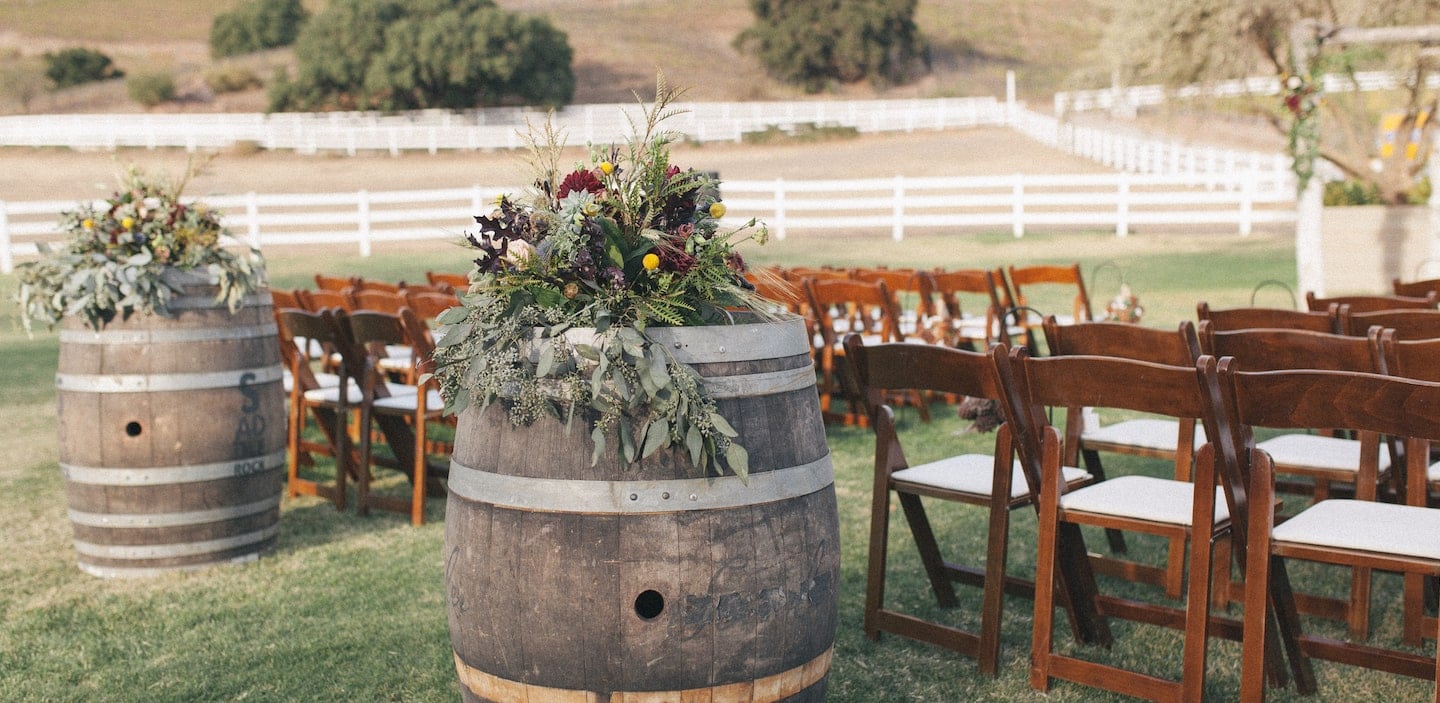Event planners and vendors have jobs that are equal parts demanding and rewarding. On one hand, planning or vending at someone’s wedding or group vacation can be a lot of stress and work. But on the other, the people in these positions are quite literally manufacturing joy for the people who are seeking it.
Breaking into this fast-paced industry can be tough. According to the Bureau of Labor and Statistics, there were only about 140,000 event planners living and working in the United States in 2019. So how should someone break into such a niche market?
Adapt. And stand out. As seen during the COVID-19 pandemic, the events industry is subject to a large-scale change at any moment. With social distancing regulations and policies enacted that have turned the industry on its head, event planners have to find ways to keep creating joyful moments and parties while being safe and following protocol.
To help you brainstorm your path to becoming an event planner, we’ve compiled a list of business ideas that are creative enough to stand out while still being safe.
Wedding ceremonies and receptions
The wedding industry has experienced a monumental shift in functioning from 2020 to now. Where extravagant, large-scale weddings with live bands and hours-long receptions on packed dance floors were once all the rage, many couples are now opting for smaller weddings with more intimate proceedings.
Where the wedding industry is going to end up is unclear, but one thing remains certain: digital is the future. Amidst wedding cancellations and invite cuts, live-streamed wedding services have become a popular option.
“Perhaps one of the largest changes has been the addition of virtual weddings,” said Neil Parker, creator of the Lovecast app. “Similar to how we’ve seen many office jobs move towards remote work, weddings have also shifted to accommodating remote guests. At the start of this, we saw many couples using work tools like Zoom to create video conferences for their weddings. But as time has passed, solutions have emerged that are more centered on the wedding experience and easier for both wedding couples and their guests alike to use.”
Those wanting to break into the wedding event service should consider how to thrive in a digital, smaller wedding environment that favors customization and intimacy. Here are a few potential business ideas:
- Start a live-stream video service
- Create wedding signage like seating charts and welcome signs
- Bake mini-desserts like cupcakes or tarts
Corporate Events
It’s not uncommon to see companies throwing large mixers or company-wide events to celebrate their success or get the company together for some fun. Though put on hold, these events have started to pop up in new ways, with companies finding ways to pivot their parties to more socially distant or virtual options.
Greg Jenkins of Bravo Productions sees a significant change involving multiple parts of the large-scale events process, from food service to cleanliness and event time scheduling. “For larger events, guests may be staggered to arrive at various times prior to the event taking place to avoid overcrowding and long lines,” he said. “While the 6-feet social distancing may slowly fade away, we all recognize being in overcrowded lines for service just does not work. In addition, there will continue to be signage to space people out to avoid overcrowding. The staggering of arrival and departure times will likely continue in the future when vendors move in and load out for setup and tear-down. This greatly helps when using freight elevators or facilities with limited load-in dock spaces.”
Event planners looking to exist in the new normal will have to think of engaging ways to participate in these events while dealing with staggered groups of people with potentially short attention spans. Here are a few potential business ideas:
- Create personalized hand sanitizer dispensers
- Create personalized guest books
- Become an activity or game coordinator to video game nights
Parties and Reunions
Whether a big corporate gathering, family reunion or other party event, people are itching to get back together in a real way. Event planners have to rise to the challenge of providing party spaces while also remaining safe and cautious. For many, this means figuring out how to adapt to new policies while also delivering a thoughtful event.
Chris Baird, managing director of Marquee Milestones, said this balance of togetherness, separation and cleanliness is becoming increasingly important. “Event vendors are searching to find a balance between spacing people out to their comfort zone and bringing people together to reunite them,” Baird said. “As the world gradually overcomes this, we believe the old standards of proxemics will be redefined and new appropriate distances for everything will go mainstream, but a higher standard of cleanliness will remain for decades.”
Those looking to break into the party planning industry can look for ways to provide fun, unique party experiences. Here are a few potential business ideas:
- Build outdoor dance floors
- Create personalized face masks
- Create touchless photo booths
Dining and Catering
Gone may be the days of buffet lines or self-serve dining experiences. Many food vendors are offering to-go kits and pre-packaged meals for guests to enjoy. And those who do opt for a buffet option have employees on-hand to serve the meals, rather than letting guests dip into a communal dish.
Greg Jenkins of Bravo Productions anticipates a long-term hold on buffets. Further, though, he anticipates that communal condiments and shakers for salt and pepper will be available by request only from the service catering the event, rather than at every table for the duration of the party.
Those interested in providing dining or catering event services should seek innovative ways to deliver fun, delicious meals without relying on communal experiences. Here are a few potential business ideas:
- Make pre-packaged meals and cocktails
- Develop a food truck to cater events
- Build personalized charcuterie boards
Nature and Outdoor Events
The nature and outdoor industries have experienced a boom in popularity, as people seek outdoor experiences that are socially distant while still being engaging and fun. Nature activities, like camping, have experienced a growth in popularity through 2020. Nearly half of respondents to the KOA Growth of Camping report stated taking their first ever camping trip during the pandemic, or restarted after years of not camping at all.
And according to Fraser Barker of Wilderness Redefined, it’s a family affair. “Whilst there have not been many positives to this pandemic, there has been one. Kids are more willing to
put down the devices in the great outdoors,” Barker said. “Hopefully, one of the trends we will continue to see is kids embracing the great outdoors after overdosing on staying inside and screen time.“
Event planners looking to follow the trail into outdoor activity can consider family-friendly activities that promote a love and appreciation for nature. Here are a few potential business ideas:
- Create bird or wildlife scavenger hunts
- Plan picnics and outdoor dining events
- Become a camping trip coordinator

How to Start an Event Planning Business
There’s no pipeline for becoming interested in event planning. Whether you’ve helped coordinate parties and fundraisers for a corporate company or organized a few bachelorette parties for friends and had a great time, event planning is an industry that isn’t dependent on degrees or formal qualifications. So long as you’ve got the drive and willingness to work hard, you can start your journey to creating your own event planning business.
However, like any new venture, you’ll need to plan. You most likely won’t go from zero to coordinating high-profile weddings in just a few weeks, but with persistence and drive you can get yourself connected to clients.
To keep yourself organized, using a checklist of action items can help you align your goals with your to-dos.
Research Your Market
Before you buy wholesale boxes of balloons and burlap, you’ll want to make sure there’s a market for your business. If you want to plan weddings or provide a wedding service, look for the number of wedding venues in your area or the number of weddings hosted monthly. Dig into the number of people who are currently providing the service you want to provide and try to plan a way to stand out.
Pick a Name
No pressure, but the name of your business will be largely important for the growth of your business. It provides the backbone of your branding, name recognition and identity in your field. Settling on a name in the early stages of launching your brand can help the rest of the steps come more easily down the line. Plus, it can be a great motivator, as picking a name can help the entire concept of the business become more tangible.
Register Your Business
Registering your business is the first step in making sure that it becomes your property. Even if your business doesn’t have a brick and mortar location, you’ll still need a physical address where important documents will be sent. Once you know where to anchor your business, you’ll need to register with the IRS to receive an Employer Identification Number (EIN). From there, you’ll need to look for any state agencies that you may need to register with, which you can find via the Small Business Administration.
Protect Your Business
Insurance is going to be necessary for your new business. Business insurance is there to provide security and protection to the financial investment you’re making in your business. A good event insurance policy can make sure you’re covered in case something unexpected occurs during an event or the planning process. The sooner you get your new business protected, the more secure you’ll feel watching it grow.
Create Your Branding
You know how you can drive past a logo and be able to tell which fast food chain, store or business it belongs to? That branding is crucial for businesses. Developing eye-catching, warm and inviting messaging can help customers feel excited about the events you can plan together while also propelling your company forward. Once you’re starting to get serious about launching your business, creating your brand’s colors and logo can help you start getting attention.
Set Up a Website and Social Media Presence
Social media is a huge driver of business nowadays, as so much information is accessible online. For event planners, an active Instagram account and inviting webpage can be the difference between booking the client and having them move on. Use social media to interact with other vendors, meet your customer base and show off all the great services you have to offer.
Start Networking and Marketing
With a catchy name, beautiful website and registration under your belt, you’re finally ready to put yourself out there and start making connections. Using a business card can help potential customers remember your name. Pass out business cards at trade shows with potential clients, engage with your customer base on social media and grow your audience to help your business take off.
During social distancing and vaccine distribution, you can get creative with your marketing and make sure your guests feel safe by using buttons, pins or stickers to say you’re vaccinated. You can also offer these pins or buttons to event guests as a fun add-on.
Host an Event!
After months of preparation and paperwork, you might start feeling antsy to get rolling on your first big event. Though it might be the fun part, it’ll still require work and preparation to make sure your event goes off without a hitch.
The success of your event is truly in the details. Using a checklist like the one we’ve provided here can help you make sense of each action item, helping you stay organized and get ready for the big day. You’ll want to have details like location, time and main point of client contact ready when needed, but you’ll also want to be able to reference your marketing plan and schedule.
You also might want to create an event toolbox, which you’ll fill with materials like tape, scissors, hair ties and bobby pins, and anything else that might become an urgent need on event day. This can be your go-to pouch for anything a guest (or an employee!) might require.
It’s in the name: event planners love planning. Starting a business can sometimes mean hoping for the best, but preparing for the worst. That’s why Thimble’s event insurance is designed to be there every step of the way.














